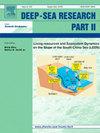Oceanic biophysical response to large-scale wind forcing observed southwest of Sumatra during December 2017
IF 3
3区 地球科学
Q2 OCEANOGRAPHY
Deep-sea Research Part Ii-topical Studies in Oceanography
Pub Date : 2025-03-13
DOI:10.1016/j.dsr2.2025.105479
引用次数: 0
Abstract
The water southwest of Sumatra is characterized by the seasonal and interannual occurrence of coastal upwelling, which drives biological variability and active fisheries. Although satellite observations show active biophysical variability at the surface, no observations of surface–subsurface physical and biogeochemical variations were available. Based on a field experiment conducted southwest of Sumatra (4.2°S, 101.5°E) by the research vessel Mirai from December 5, 2017 to January 1, 2018, this study reports observational results for ocean temperature, salinity, nutrients, and biological variations. During the observation period, westerly winds dominated the eastern equatorial Indian Ocean, with northwesterly winds southwest of Sumatra. This wind forcing was unfavorable for local coastal upwelling. Time series of in situ observations indicated gradual shoaling of the thermocline from mid-to late December 2017. This thermocline displacement was attributed to the propagation of equatorial and coastal Kelvin waves in response to the appearance of easterly winds (weakening of westerly winds) in the central (eastern) equatorial Indian Ocean. Concurrent with thermocline shoaling, we observed active mixing at the top of the thermocline, upward transport of nutrients to the euphotic layer, and subsurface phytoplankton growth. These biophysical responses demonstrate that even if local wind forcing is unfavorable for coastal upwelling, remote wind forcing can affect the nutrient supply that supports biological activity off Sumatra through Kelvin wave propagation. These results will provide fundamental data for validating biophysical models of the eastern Indian Ocean.
2017年12月苏门答腊岛西南部观测到的大尺度风强迫的海洋生物物理响应
苏门答腊岛西南水域的特点是沿海上升流的季节性和年际发生,这推动了生物多样性和活跃的渔业。虽然卫星观测显示地表有活跃的生物物理变化,但没有地表-地下物理和生物地球化学变化的观测资料。基于2017年12月5日至2018年1月1日Mirai考察船在苏门答腊岛西南部(4.2°S, 101.5°E)进行的野外实验,本研究报告了海洋温度、盐度、营养物质和生物变化的观测结果。观测期间,东赤道印度洋以西风为主,苏门答腊岛西南方向为西北风。这种风力对当地沿海上升流是不利的。现场观测的时间序列表明,从2017年12月中下旬,温跃层逐渐变浅。这种温跃层位移归因于赤道和沿海开尔文波的传播,以响应赤道印度洋中部(东部)的东风(西风减弱)的出现。在温跃层浅化的同时,我们观察到温跃层顶部的活跃混合,营养物质向上输送到热流层,以及地下浮游植物的生长。这些生物物理响应表明,即使当地的风强迫不利于沿海上升流,远程风强迫也可以通过开尔文波传播影响支持苏门答腊岛外生物活动的营养供应。这些结果将为验证东印度洋生物物理模型提供基础数据。
本文章由计算机程序翻译,如有差异,请以英文原文为准。
求助全文
约1分钟内获得全文
求助全文
来源期刊
CiteScore
6.40
自引率
16.70%
发文量
115
审稿时长
3 months
期刊介绍:
Deep-Sea Research Part II: Topical Studies in Oceanography publishes topical issues from the many international and interdisciplinary projects which are undertaken in oceanography. Besides these special issues from projects, the journal publishes collections of papers presented at conferences. The special issues regularly have electronic annexes of non-text material (numerical data, images, images, video, etc.) which are published with the special issues in ScienceDirect. Deep-Sea Research Part II was split off as a separate journal devoted to topical issues in 1993. Its companion journal Deep-Sea Research Part I: Oceanographic Research Papers, publishes the regular research papers in this area.

 求助内容:
求助内容: 应助结果提醒方式:
应助结果提醒方式:


